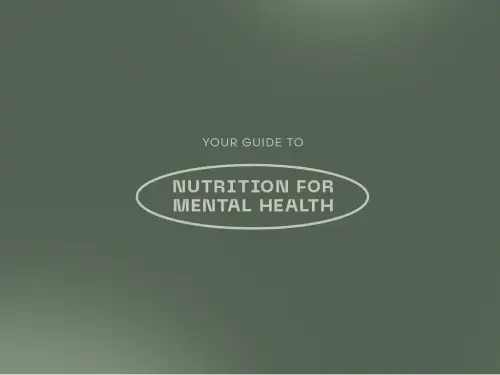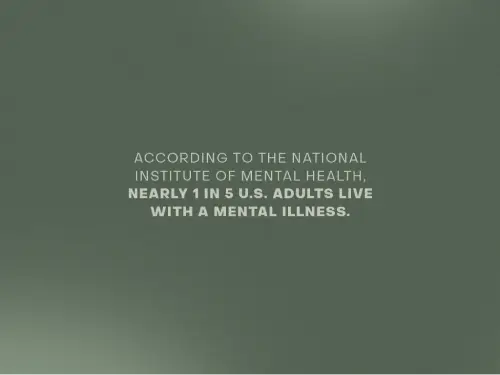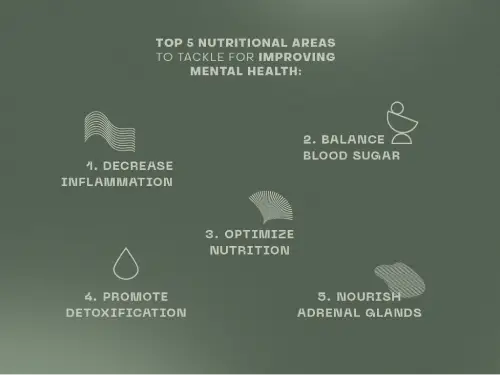Blog
Nutrition for Mental Health

“Mental health includes our emotional, psychological, and social well-being. It affects how we think, feel, and act. It also helps determine how we handle stress, relate to others, and make choices. Mental health is important at every stage of life, from childhood and adolescence through adulthood. 1” There are many factors that influence mental health – genetics, trauma, family history, lifestyle – this blog will focus on how nutrition affects our minds and emotions.
As you will learn, nutrition is vital for creating and maintaining healthy moods. Since most of us have control over what we eat, why wouldn’t we want to understand how to shift our diet to better support our mental and emotional wellbeing? Especially if you or one of your loved ones is struggling with a related disorder, which is likely the case – According to the National Institute of Mental Health, nearly 1 in 5 U.S. adults live with a mental illness.
Anxiety disorders are the most common and under-treated mental illness in the United States. Major depressive disorder is the leading cause of disability for Americans aged 15 to 44. Bipolar disorder often takes up to ten years of living with symptoms before an accurate diagnosis is made. Neurodegenerative diseases (including Alzheimer’s disease and Parkinson’s disease) are rising rapidly with the increase in elderly populations. “Brain fog” has become a chief complaint for patients seeking medical care…
How does nutrition affect mental health?
Dr. Uma Naidoo, a board certified Harvard trained psychiatrist, professional chef, nutrition specialist, and author of This is Your Brain on Food, says that “until we solve nutritional problems, no amount of medication and psychotherapy is going to be able to stem the tide of mental issues in our society.” She emphasizes the inextricable link between the gut and brain by way of the vagus nerve and microbiome (where 90% of serotonin, our happy hormone, is made) and promotes a diverse, nourishing, fiber-rich array of plant foods!
Top 5 nutritional areas to tackle for improving mental health:
1. Decrease inflammation: inflammation has been implicated in several mental health disorders. Here are primary ways to decrease inflammation with nutrition:
- Sources of inflammation include overweight/obesity, impaired immunity, imbalanced hormones, physical traumas, and poor lifestyle
- Special note for gut inflammation – assessment and treatment of digestive disorders (such as leaky gut) is fundamental to supporting mental health!
- Anti-inflammatory diets are those that promote a wide variety of fruits and vegetables, spices, healthy fats, quality protein, complex carbs, and eating organic
- Pro-inflammatory diets (AKA standard American diet) are those that are high in highly processed foods, red meats, and alcohol
- Nutrients shown to decrease inflammation include EPA/DHA fish oil, vitamin D, vitamin K2, glutathione, turmeric, and resveratrol, as well as avoidance of food allergens/sensitivities
2. Balance blood sugar: blood sugar imbalance has been implicated in several mental health disorders. Here are primary ways to balance blood sugar with nutrition:
- Eat enough fiber – eating fiber throughout the day helps balance blood sugar levels; the recommendation is at least 25 grams per day for women and 38 grams for men
- Eat regular meals – eating a wholesome meal or snack every few hours, including breakfast, helps keep blood sugar levels steady throughout the day
- Pair your macros – eating a high-quality protein and/or healthy fats with all meals and snacks that contain carbohydrates helps balance blood sugar levels
- Eat low glycemic – high glycemic foods (i.e., many processed foods with added sugars or refined carbohydrates) directly spike blood sugar levels
3. Optimize nutrition: malnutrition has been implicated in several mental health disorders. Here are primary ways to enhance nutritional status with nutrients:
- Correct nutritional insufficiencies and deficiencies
- Especially vitamin D, vitamin B, and iron – always replete nutrients with supplementation under the supervision of a health care provider
- Eat adequate protein for neurotransmitter (NT) production
- We need certain amino acids to make NT’s in the body; tryptophan for serotonin (enthusiasm NT), glutamine for GABA (calming NT), and tyrosine for dopamine (motivating NT). Aim to eat a minimum of 0.8 grams per kilogram of body weight per day (e.g., 54 grams daily for a 150 lb. person)
- Eat adequate omega 3 fatty acids for the brain and nervous health
- Primary sources of omega 3 fats include salmon, mackerel, anchovies, sardines, herring, and low-mercury brand tuna – aim to eat at least 2 4-ounce servings per week of wild-caught fatty fish
- Note: Talk to your naturopathic doctor about supportive supplements and nutritional formulations specific for mental health conditions!
4. Promote detoxification: environmental toxicities have been implicated in several mental health disorders. Here are primary ways to detox with nutrition:
- Stay hydrated – drinking enough water (a minimum of ½ of your body weight in ounce daily) is important for constantly flushing out toxins
- Eat cruciferous vegetables – cruciferous vegetable support liver detoxification, sources include broccoli, cauliflower, cabbage, Brussel sprouts, arugula, and more
- Eat the rainbow – colorful fruits and vegetables contain fiber, water, vitamins, minerals, and phytonutrients that help promote cleansing of the body
- Eat spicy foods – spicy foods like ginger, cayenne, and rosemary help stimulate blood circulation so that toxins can be eliminated from the body
5. Nourish adrenal glands: high and/or chronic stress has been implicated in several mental health disorders. Here are primary ways to support adrenal health with nutrition:
- Balance blood sugar – following the recommendations above to balance blood sugar will help keep cortisol levels steady throughout the day
- Fill up on vitamin C – the adrenal glands concentrate vitamin C, sources include kiwifruit, lemons, oranges, red peppers, tomatoes, berries, potato, and more
- Fill up on vitamin B5 – the adrenals use a lot of vitamin B5, it is found in almost all plant and animal foods so eating a whole, balanced diet should be sufficient
- Supplement adaptogens – adaptogens are herbs that improve the stress response, such as ashwagandha and holy basil, talk to your ND about which are right for you
Please see a naturopathic doctor at LIVV to design you an individualized nutrition plan for you and your mental health. They will also be able to help rule out any underlying conditions that could be contributing to poor mental health. If you or a loved one is struggling with a mental health disorder, we encourage you to seek help immediately. The LIVV team is here to help you feel better!
Written by Jordan Valdez, RDN
Resources
Emergencies: call 911 or visit your nearest hospital emergency department
National suicide prevention lifeline (24 hr support): 800-273-8255
Find a psychiatrist: https://finder.psychiatry.org/
Find a psychologist: https://locator.apa.org/
References
- Mentalhealth.gov
- Adaa.org
- NIH.com
- Achn.net
- Dbsalliance.org
- Pubmed.com


